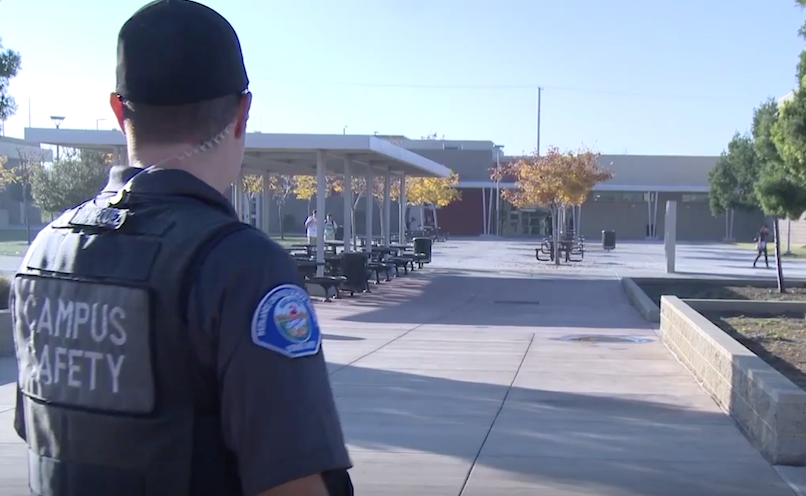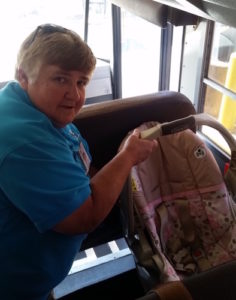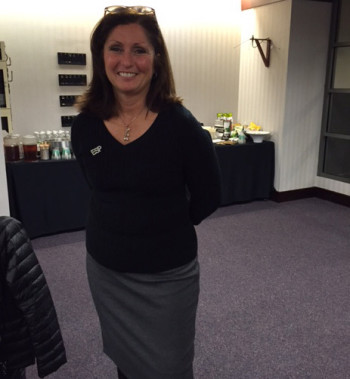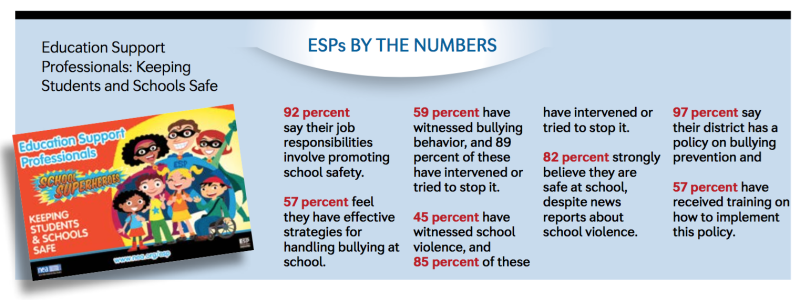 Every day, in every public school, education support professionals (ESPs) keep students safe. School bus drivers know the proper evacuation routes and safety procedures on the bus. School security staff keep the school campus free of drugs, crime, and illegal substances. Trades staff keep campuses safe and clean. Student services professionals advocate for greater mental health resources. Secretaries intervene in bullying situations, and work to help the victim and the bully. Custodians serve on school safety committees. Nurses look for signals that a student may be shouldering an eating disorder, drug addiction, or other challenge. The list goes on, but what it comes down to is that ESPs contribute to student safety in ways that are significant and innumerable.
Every day, in every public school, education support professionals (ESPs) keep students safe. School bus drivers know the proper evacuation routes and safety procedures on the bus. School security staff keep the school campus free of drugs, crime, and illegal substances. Trades staff keep campuses safe and clean. Student services professionals advocate for greater mental health resources. Secretaries intervene in bullying situations, and work to help the victim and the bully. Custodians serve on school safety committees. Nurses look for signals that a student may be shouldering an eating disorder, drug addiction, or other challenge. The list goes on, but what it comes down to is that ESPs contribute to student safety in ways that are significant and innumerable.
Here are just a few of the countless ESPs who provide students with a much-needed safe haven.
Victor Marquez, School Security Officer, Citrus Valley High School, Redlands, CA.
School security staff are on the frontlines of school safety. From playground scuffles, students who smoke on school grounds, and mechanical accidents, to disasters—whether natural or manmade— and other situations, these highly trained professionals provide schools with leadership and expertise when it’s time to prepare for or react to a crisis.
In a recent NEA video, Victor Marquez, a security officer at Citrus Valley High School in Redlands, Calif., talks about the role he and his colleagues play in schools across the nation.
Karen Barnes, School Bus Coordinator, Austin Independent School District, Austin, TX.
Karen Barnes’ district educates approximately 85,000 students and embraces 129 diverse school communities. Austin Independence School District (AISD) also transports thousands of students along more than 370 school bus routes daily. Safety is Barnes’ primary concern. Her certifications from the National Association of Pupil Transportation and the Texas Association of Pupil Transportation are proof. “I’ve been working for over 20 years in school transportation, but there are still things that I can learn, and the kids deserve to have people who want to do the very best possible job for them,” says Barnes.
While she doesn’t drive regularly, Barnes is responsible for the professional development of the 150 school bus drivers and approximately 75 bus monitors assigned to the Nelson Bus Terminal in Northeast Austin. Their training includes everything from teaching appropriate CPR and rst aid procedures to wheelchair and car seat securement.
 Karen Barnes
Karen Barnes
“One of my greatest passions is making sure children with special needs are able to safely ride in our buses,” says Barnes, who is known to visit students’ homes for wheelchair maintenance, and has a reputation for advocating fiercely with wheelchair companies on behalf of students.
Barnes recently designed and built a special needs wheelchair securement training station, which allows her to train more employees at one time. The station has become so popular that Barnes built a duplicate station at another terminal.
Some of the drivers trained by Barnes also transport students who are also moms bringing their infants to onsite daycare centers. This way, the young mothers can continue their education while their children receive quality care. The infants ride in car seats installed by Barnes. To ensure safety measures are met, the AISD only utilizes car seats owned by the district. “I would love to be able to transport these mothers and infants together on coach buses so they would always have air-conditioning in this Texas heat and could make connections with other young mothers deter- mined to get their education,” Barnes says.
 Jean Fay
Jean Fay
Jean Fay, Special Education Paraeducator,
Crocker Farm Elementary School, Amherst, MA.
When Sandy Hook Elementary School in Newtown, Conn. became the site of a mass shooting in 2012, Jean Fay strengthened her commitment to keep schools safe and ensure students have access to physical and mental health services. Today, Fay is a staunch advocate for common-sense gun laws—locally and nationally.
“Turning our public schools into fortresses is not the answer,” Fay says. “Instead of arming our school staff with guns, we should be arming them with the resources needed to continue to provide the best possible education for our students.”
Knowledge, passion, activism, and transformation are four words that define Fay’s work. “We need to be having conversations about ensuring that educators have increased access to mental health services for their students,” she says. “We need conversations about taking meaningful action on gun violence prevention."
The children of our nation, she adds, are the most valuable resource we possess. Says Fay: “We need to provide a school environment where children feel safe and nurtured. Arm our teachers, our guidance counselors, our support staff with the resources they need to reach and teach every student, every day.”
 Recently, the Northwest District Attorney for the Commonwealth of Massachusetts, Massachusetts Teachers Association (MTA), NEA, and other partners sponsored the third annual Safe School Summit in Holyoke, Mass.
Recently, the Northwest District Attorney for the Commonwealth of Massachusetts, Massachusetts Teachers Association (MTA), NEA, and other partners sponsored the third annual Safe School Summit in Holyoke, Mass.
As a member of the District Attorney’s Citizens Advisory Board, Jean Fay was instrumental in the planning and implementation of the recent third an-nual Safe School Summit, held in Holyoke, Mass. A joint effort of the Northwest District Attorney for the Commonwealth of Massachusetts, MTA, NEA, and other partners, the event brought together educators, elected leaders, law enforcement personnel, judicial staff, social and health service providers, parents, and community members.
At the state level, Fay is a member of the Task Force on School Safety and Security and the Elementary and Secondary Education Safe and Secure Schools Commission.
“Unfortunately we continue to put politics before the safety of children,” Fay says. “I’m hopeful that soon this will change, and that we’ll have common sense gun regulation.”
To learn more about how ESPs serve the whole child by keeping students supported, challenged, safe, healthy and engaged, and more, read NEA's new ESP book.






